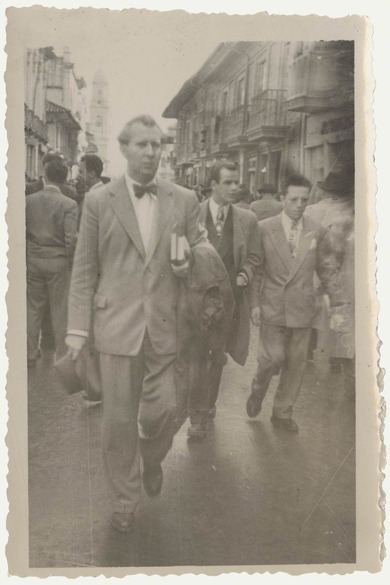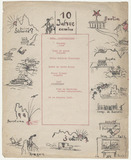Erich Arendt
Als ich aus Deutschland floh – o schweres Fliehen! –
Flog wie verfolgt das Land am Zug vorbei.
Ein schmales Büchlein lag auf meinen Knieen,
und meine Lippen formten nur mit Mühen,
was sie sonst froh gestimmt: Dein Lied Tandaradei![When I fled Germany – oh heavy flight! –
The land flew past the train like one pursued.
A slim book lay on my knees,
And with difficulty my lips formed sounds
They once sang with joy: your song tooweettoowoo! (ed. trans.)]
Erich Arendt, Walter von der Vogelweide, March 1933
| Born | on 15 April 1903 in Neuruppin, Germany |
|---|---|
| Died | on 25 September 1984 in Wilhelmshorst near Potsdam, German Democratic Republic |
| Exile | Switzerland, Spain, France, Colombia |
| Remigration | German Democratic Republic |
| Profession | Writer |
Erich Arendt began as a teacher at a reform school in the Berlin district of Neukölln, now the Rütli school. In 1926 his first poems appeared in Der Sturm, the Expressionist journal headed by Herwart Walden. Johannes R. Becher criticised the Communist Party member’s verse. Consequently he temporarily withdrew from literary activities. On 11 March 1933 he managed to flee to Switzerland. His wife Katja Hayek-Arendt followed him to Ascona, and in 1934 they went together to Mallorca. From 1936 Arendt took part in the Spanish Civil War as a reporter in a Catalonian regiment.
After the Spanish Republic fell he managed to flee over the Pyrenees to France in March 1939. His manuscripts were left behind in Spain and never recovered. After the German Wehrmacht occupied France in May 1940 he was held in the stadium of Colombes in Paris. In the Bassens internment camp Arendt met the cook of a Columbian consul with whose help he and his wife made it to Columbia in 1942. There he joined the ANFB and the Comité Democratico Alemania Libre en Colombia.
Arendt already spoke the relevant languages before going into exile in France, Spain and Columbia. He made contact with rural communities, photographed people and exotic landscapes. In his poetry volume Tolú he describes an isolated Columbian fishing village, as well as the dignity and beauty of its inhabitants.
After his return in 1950 Erich Arendt was one of the most significant translators of poetry from Spanish to German, working for publishers in both East and West Germany. For his own poetry he was regarded in East Germany as a “word alchemist”. When Peter Huchel emigrated in 1971 he left Arendt his house in Wilhelmshorst, where he died in 1984.
Selected works:
Trug doch die Nacht den Albatros (Gedichte, 1951)
Tropenland Kolumbien (Bildband, 1954)
Tolú. Gedichte aus Kolumbien (1956)
Zeitsaum (Gedichte, 1978)
Further reading:
Laschen, Gregor / Schlösser, Manfred (Hg.): Der zerstückte Traum – Für Erich Arendt zum 75. Geburtstag. Berlin und Darmstadt: Agora Verlag 1978
Röder, Hendrik (Hg.): Vagant, der ich bin. Erich Arendt zum 90. Geburtstag. Texte und Beiträge zu seinem Werk. Berlin: Gerhard Wolf Janus press 1993
Böthig, Peter (Hg. unter Mithilfe von Tilo Köhler): Menschen sind Worttiere. Erich Arendt 1903 – 1984. Texte und Bilder. Katalog zur Ausstellung anlässlich der 100. Wiederkehr seines Geburtstages. Schloss Rheinsberg: Kurt Tucholsky-Gedenkstätte 2003



